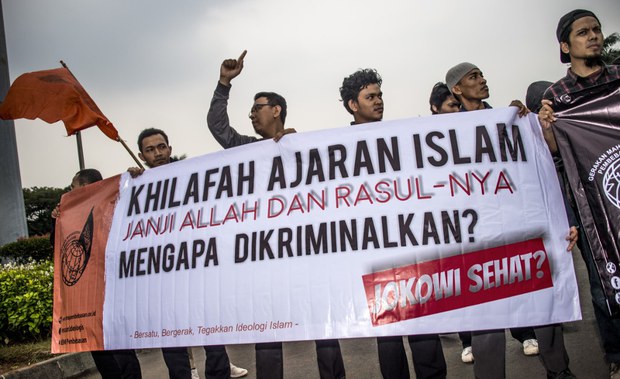Report: Tough Tactics against Indonesian Muslim Hardliners Could Backfire on Jokowi
2019.07.24
Jakarta
 Muslim student activists take part in an anti-government rally in Jakarta, after President Joko Widodo signed a new law to disband Hizbut Tahrir Indonesia, the local branch of a radical Islamic group which seeks to unify all Muslims into a caliphate, July 12, 2017.
Muslim student activists take part in an anti-government rally in Jakarta, after President Joko Widodo signed a new law to disband Hizbut Tahrir Indonesia, the local branch of a radical Islamic group which seeks to unify all Muslims into a caliphate, July 12, 2017.
As he begins his second term, Indonesia’s president should be careful to not implement policies that could repress free speech and worsen political and religious divisions exposed by the April election and its aftermath, a Jakarta-based think-tank says in a new report.
President Joko “Jokowi” Widodo should refrain from using defamation laws to silence critics while addressing social grievances voiced by hardline Muslim groups, according to the report published by the Institute for Policy Analysis of Conflict (IPAC) on Tuesday.
“The challenge for President Jokowi in his second term is to ensure that policies aimed at undermining extremism do not exacerbate the political polarization that the election revealed,” IPAC said.
An analyst with the think-tank expanded on this.
“The Jokowi government’s decision to take a tougher line against extremism is welcome, but he needs to ensure that tactics used do not feed a new narrative of repression,” IPAC analyst Nava Nuraniyah said in the report.
“He can do that by ensuring there are clear criteria for curbing hate speech, that defamation laws are not used to arrest individuals for casual criticism of public officials and that there is a clear distinction made between criminal incitement and legitimate dissent,” she said.
IPAC said Jokowi should ensure that all Muslims in the country benefit from government policies, otherwise he could be seen as favoring only the moderate and Java-centric Nahdlatul Ulama (NU), the country’s largest mass Muslim organization that backed his electoral campaign.
Jokowi won in Central and East Java, the stronghold for NU, as well as in provinces where non-Muslims are the majority, such as mainly Hindu Bali and predominantly Christian East Nusa Tenggara, while his challenger, Prabowo Subianto, dominated in staunchly Muslim West Java and most of Sumatra island.
“While being careful not to appease the intolerant religious right, the president can focus on ensuring that he is less vulnerable on the inequality charge by ensuring that his economic programs are not concentrated on Java and in NU-dominated areas but are spread evenly across different Islamic groups and regions,” IPAC said.
Post-election unrest
In the aftermath of the election, police arrested two of Prabowo’s prominent campaigners, Eggy Sudjana and Lieus Sungkarisma in May on charges of treason for allegedly threatening to mobilize masses over concerns the election was rigged. They have since been released from detention while charges have not been dropped.
A rally by Prabowo’s supporters descended into chaos, beginning on May 21, when officers clashed with protesters. Nine people died and scores were injured over two nights of rioting.
The protesters had demanded that the Election Supervisory Agency take action in response to allegations by Prabowo’s camp that the election was stolen.
Police have insisted that the rioting was not spontaneous but incited by third parties bent on creating chaos to destabilize the country.
In addition, national police spokesman Dedi Prasetyo denied that security personnel had acted repressively in dealing with pro-Prabowo supporters.
“We took action to prevent acts of terrorism which can endanger the nation,” he told BenarNews.
“We don’t want Indonesia to become another Syria, Iraq or Yemen. Security is very important for national development and our welfare as a nation,” he said.
The May protests were much smaller than rallies organized by hardline Muslim groups in late 2016 and early 2017 against then-Jakarta Gov. Basuki “Ahok” Tjahaja Purnama over accusations that he had blasphemed Islam.
Ahok, a Christian of Chinese descent who had served as deputy to Jokowi when the latter served as Jakarta governor before running for president, was convicted of blasphemy and sentenced in 2017 to two years in prison. He was released in January.
Security threats
The IPAC report said police had come to see ultra-conservative Muslim groups as one of the biggest security threats facing Indonesia.
This translated into a greater reliance on repressive tactics, including arrests and intimidation, unusually tight enforcement of rally permits, stepped up scrutiny of social media, and an effort to portray political Muslims as being one step away from violent extremists, the report said.
A presidential spokeswoman defended the government’s actions.
“Law enforcement officers take action based on valid evidence and the due process, and we have an impartial judicial system,” Jaleswari Pramodhawardhani told BenarNews.
“In countering attempts by certain groups to undermine Pancasila (the state ideology), the government makes no compromises and has taken decisive steps including dissolving radical mass organizations through courts,” she said. “In addition, the government continues to promote religious moderation by involving relevant stakeholders.”
She said courts had the final say in these cases.
“All actions taken by law enforcement officers must ultimately go through a mechanism in the judiciary that cannot be intervened,” she said.







